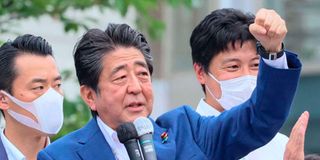Premium
Abe’s death unmasks shaky China-Japan ties

This picture taken on July 6, 2022 shows former Japanese Prime Minister Shinzo Abe delivering a campaign speech for the ruling Liberal Democratic Party candidate Keiichiro Asao for the Upper House election in Yokohama, suburban Tokyo.
Former Japanese Prime Minister Shinzo Abe may have been buried but his ghosts are still lingering, unmasking a shaky relationship with China.
Mr Abe, who was assassinated on July 8 as he gave a campaign speech, was laid to rest on Tuesday July 12. However, his policies as Prime Minister, and especially those touching on China’s interests have perpetuated online banter.
In China’s media outlets, some readers continue to append comments on stories celebrating his death, or at least criticising his policies even after he is gone.
Shinzo Abe was Japan’s longest serving Prime Minister with stints from 2006 to 2007, and again from 2012 to 2020 when he left office under health reasons. And even after that, he was a vocal leader of the ruling Liberal Democratic.
After he died, the Chinese Foreign Ministry issued a condolence message, saying Abe made contributions “towards improving China-Japan relations during his term.”
But Beijing was forced to deny links to online ‘celebrations’ of Abe’s death, saying the reactions cannot punctuate Chinese-Japanese relations.
“I have just fully expressed the Chinese government’s position that this unexpected incident should not be associated with Sino-Japanese relations,” Foreign Ministry Spokesman Zhao Lijian told a media conference last week.
But as Abe was laid to rest, Beijing was critical of the attendance of Taiwanese Vice-President William Lai Chin-te. Chinese Foreign Ministry Spokesperson Wang Wenbin this week curtly responded to a reporter:
“I need to correct you first. Taiwan is part of China. There is no so-called ‘Taiwan Vice President’.”
“After the sudden and unfortunate passing of former Prime Minister Shinzo Abe, the Taiwan authorities have sought to engage in political manipulation and benefit politically by taking advantage of the incident.
“Their political calculations will not succeed. The Chinese side has lodged stern representations to the Japanese side both in Beijing and Tokyo and has made our position absolutely clear.”
Later, Japan said the Taiwanese official was attending in personal capacity.
China considers Taiwan its territory even though both sides stick to ‘One China.’ In 1971, Beijing, the People’s Republic of China formally replaced the Republic of China as a UN member.
The new capital was Beijing, which has demanded that the entire UN membership recognise only ‘one China’ whose capital is Beijing.
Shinzo Abe’s Japan had roiled Beijing even though it formally ended diplomatic recognition of Taiwan in 1972. As Prime Minister, Abe routinely wrangled with Beijing over ownership of Senkaku Islands, an archipelago claimed by both Tokyo and Beijing, but which Taiwan incidentally also claims.
Abe though had moved closer to Taiwan, calling them “important partners” in a 2015 speech. It was two years after the two sides had signed an agreement on fishing rights in the East China Sea.
Japan has in the past also helped Taiwan exhibit its prowess in various fields, supported by the US.
And Abe had also argued that Japan would consider threats on Taiwan as its own alongside allies of Japan. In commentaries, Abe even criticised ambiguous US policies towards Taiwan, warning they were likely to cause instability in the region.
In an opinion piece in April, Abe demanded that Washington pledge readiness to protect Taiwan should China invade.
It is no wonder that China’s news sites are littered with critical comments. People who didn’t like these policies generally promised to celebrate or “eat something good” after he died. Others praised the shooter as a hero while others cashed on the funeral to make sales, including making offers of gloves for those who buy bicycles.





